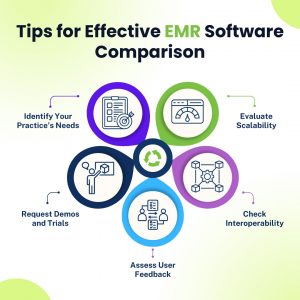EMR Software Comparison for Multi-Specialty Practices: A Complete Guide
Running a multi-specialty practice can be difficult because each specialty has different needs. EMR Software Comparison is essential to finding the right system which makes processes easier, improves patient care, and saves time. But with so many choices, it can be hard to decide which one is best for your practice. This guide will explain what to look for in EMR software and how to compare your options. So, let’s learn how to find the right EMR system for your multi-specialty practice!
Understanding Multi-Specialty Practices and Their Needs
Multi-specialty practices provide different types of health care in one place. This helps patients get better care, but it also makes coordination more difficult. Centralized Medical Records are very important because they make sharing information between departments easy. Because every specialty has its way of working, your EMR needs to handle many workflows. If your EMR supports these needs, your practice will work better, and patients will receive better care.
Why EMR Software Comparison Matters for Multi-Specialty Practices?
Not all EMR systems are made for multi-specialty practices. This is why it’s important to do an EMR Software Comparison. If you don’t compare, you might choose software that doesn’t fit your practice. But when you look at how different systems work, you can pick one that works well for your team. Make sure it includes tools like EHR integration, so your practice stays latest with modern health care.
Tips for Effective EMR Software Comparison

Choosing the right EMR system can feel like a lot of work, but these tips can help you out:
1- Identify Your Practice’s Needs: Write down what you need, like support for multiple specialties, easy-to-use software, and connections to Medical Billing Services. Because every practice is different, this step helps you focus on what matters most.
2- Evaluate Scalability: Your practice might grow in the future, so you need software that can grow with it. If you add more specialties, the system should handle the extra work without issues.
3- Check Interoperability: The EMR should work smoothly with labs, pharmacies, and other systems. So, pick software that allows easy communication with these services.
4- Assess User Feedback: Look at reviews from other practices, especially ones using RCM tools, to see what works well. If you read their experiences, you can avoid mistakes and choose better software.
5- Request Demos and Trials: Testing the software will show you how it works with your practice. Because every practice is different, this step ensures the EMR fits your needs.
Impact of EMR on Multi-Specialty Practices
The right EMR system can change how your practice works. It makes documentation easier and helps departments share information faster. This also improves Medical Billing Services, as billing becomes faster and more accurate. Because all the information is in one place, providers can access Medical Records quickly and make better decisions. Patients also benefit a lot from a good EMR. Because the system makes everything more efficient, they get better care without long waits. Providers can also use tools to analyze data and improve how the practice works. So, having a good EMR system makes your practice better for both patients and staff.
ReLi Med Solutions: Your Trusted EMR Partner
For multi-specialty practices, ReLi Med Solutions is a great choice. Their EMR platform is built to help different specialties with tools like templates and strong EHR integration. Because it is easy to use and very efficient, it can make your work much smoother. ReLi Med Solutions also keeps patient data safe and follows HIPAA rules. If you ever need help, their support team is ready to guide you. So, ReLi Med is a reliable option to improve patient care and manage your practice better.
Conclusion
Choosing the right EMR is very important for a multi-specialty practice. If you carefully compare systems through an EMR Software Comparison, you can find one that fits your specific needs. Because every practice is different, it’s essential to pick software that can grow with your practice and handle new challenges. Look for features like scalability and tools for Medical Billing Services to make daily tasks easier and support future growth. With the right EMR, your practice can run smoothly and provide better care for your patients.

